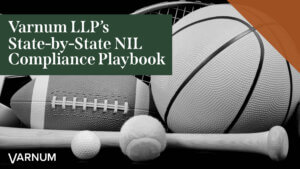On June 1, 2023, the California Assembly narrowly passed legislation that could revolutionize the way college athletes are compensated. If enacted, the College Athlete Protection (“CAP”) Act, or A.B. 252, would open the door for student-athletes in California to receive payments directly from their schools, aligning their compensation with the revenue generated by their teams. Proposed by Assembly Member Chris Holden, a former basketball player at San Diego State University, the bill has gained significant momentum since its introduction in January, receiving approval from the Assembly’s Higher Education Committee and clearing the Appropriations Committee.
The CAP Act, which aims to provide rights, benefits and safeguards for college athletes, requires certain intercollegiate athletic programs at four-year private universities or campuses of the University of California or California State University that receive an average of $10,000,000 or more in annual income from media rights for athletics to comply with specific requirements regarding student-athlete rights. These requirements include a degree completion fund for college athletes, distribution of notices outlining college athlete rights and protection against retaliation for reporting violations. Following graduation, student-athletes would earn access to the designated funds, which not only support degree completion programs but cover medical expenses and improve safety measures. The CAP Act would further establish the College Athlete Protection Program within the Office of Planning and Research, overseeing a 21-member CAP Panel composed of appointed individuals responsible for administering the CAP Act. A California Athlete Protection Fund would also be created, with appropriated funds allocated to the CAP Panel for implementing the CAP Act.
The bill proposes equal pay for both men’s and women’s program members, requiring institutions to demonstrate annual compliance with Title IX. Under the proposed plan, starting from the 2023–24 school year, revenue exceeding the baseline of the 2021–2022 academic year would be shared among student-athletes. Payments to players would be distributed using a formula that allocates half of the funds to male athletes and the other half to female athletes each year, benefiting players in revenue-generating programs. Schools would have discretion over the distribution of any remaining funds in the men’s or women’s pools, potentially providing paychecks to graduating student-athletes in sports that do not generate profits.
The National College Players Association, a California-based advocacy group for college athletes, is a major proponent of the bill. In 2019, they successfully advocated for and helped pass the first state law protecting college athletes’ name, image and likeness (NIL), a move that prompted the Supreme Court to strike down the NCAA’s policies against NIL in 2021. Despite the bill’s uncertainties and complexities, it represents a significant development in expanding college athlete protections through state legislation, and is blurring the lines between “amateurism” and “professionalism” in college sports, challenging the NCAA’s long-held policies that regarded student-athletes as amateurs in their sports.
Although the CAP Act primarily targets California schools and student-athletes, its potential passage could have far-reaching implications for the rest of the country. When California enacted the first NIL bill in 2019, it triggered a wave of similar legislation in other states that were driven by the desire to stay competitive in the college sports arena. If the CAP Act is signed into law, a similar domino effect may occur, creating a nationwide paradigm shift in how student-athletes are able to benefit from their name, image and likeness.
2023 summer associate Dilan Kama contributed to this advisory. Dilan is currently a student at Wayne State University Law School.
Download Varnum's State-by-State NIL Compliance Playbook
 To aid individuals, schools and collectives with the often inconsistent and rapidly developing legislative and executive actions of the states, Varnum’s dedicated team of NIL attorneys created an all-inclusive, state-by-state compliance playbook. Learn more and download your free copy: varnumlaw.com/NILguide
To aid individuals, schools and collectives with the often inconsistent and rapidly developing legislative and executive actions of the states, Varnum’s dedicated team of NIL attorneys created an all-inclusive, state-by-state compliance playbook. Learn more and download your free copy: varnumlaw.com/NILguide

